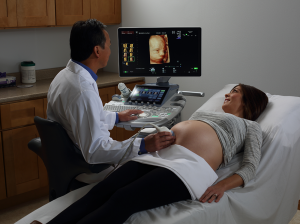Artificial intelligence (AI) is becoming an important utility in many aspects of healthcare. It can now be seen in action alongside certain cardiac ultrasounds, or echocardiograms (ECGs), thanks to California-based Caption Health. The company is collaborating with Northwestern Medicine to bring new AI ultrasound systems to clinical practice at Northwestern Memorial Hospital in Chicago, Illinois.
Made for use with compatible diagnostic ultrasound systems, the Caption Guidance software helps provide patients with enhanced cardiac assessments at the point of care. Northwest Memorial is the first hospital in the U.S. to use Caption Health’s AI software, which could increase access to quality diagnostic images for healthcare systems across the nation.
Cardiovascular disease is the leading cause of death in the U.S. and a contributing factor in increasing the risk of severe illness associated with COVID-19. ECGs can be used to detect early signs of heart disease, and Caption Guidance AI makes getting clearer images easier.
Although it takes years of professional training and education to become a professional sonographer, Caption’s interactive AI user interface provides real-time information that helps guide technicians to retrieve images quickly and accurately.
Using deep machine learning, the company has developed a platform that provides expert turn-by-turn guidance that can be utilized by most medical professionals. The software also automatically measures ejection fraction, the percentage of blood that leaves the heart with each contraction, which is commonly used to evaluate cardiac function.
Caption’s software can provide highly accurate diagnostic information rapidly, which could help prevent or reverse heart failure. The software also has the potential to make these analyses more widely available for remote medical facilities like rural clinics or private practices.
The avenues of utility for AI in cardiology are increasing as quickly as they are developed, and scientists are working in-hand with medical doctors to advance new implementations toward better care. For instance, Minnesota’s Mayo Clinic is using AI to enhance the analysis of CT data in ER stroke patients, as well as testing and detecting irregularities or weakness in heartbeats.
Institutions like Northwestern Medical and the Mayo Clinic are already using AI-powered technologies in their clinics, medical ICUs, and emergency departments, and continued use and research is sure to continue benefitting cardiologists and other medical professionals.























